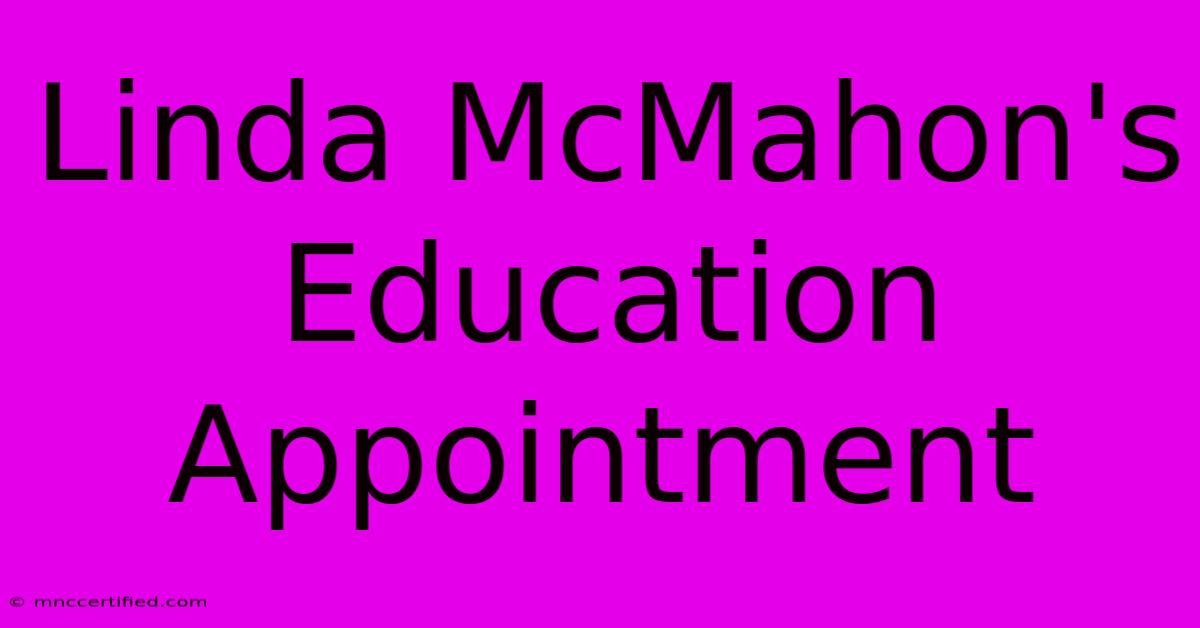Linda McMahon's Education Appointment

Table of Contents
Linda McMahon's Controversial Education Appointment: A Deep Dive
Linda McMahon, a prominent figure in the world of professional wrestling and politics, served as the Administrator of the Small Business Administration (SBA) under President Donald Trump. However, a lesser-known aspect of her career involves a brief but impactful role in education. This article delves into the details of her appointment, the surrounding controversies, and its lasting implications.
The Appointment and its Context
While McMahon's tenure as SBA Administrator garnered significant attention, her involvement with education was more subtle. She wasn't appointed to a high-profile education position like Secretary of Education. Instead, her influence on education was more indirect and often involved advocating for policies impacting small businesses that, in turn, affect educational opportunities. This often involved supporting initiatives that fostered entrepreneurship and job creation, indirectly benefiting educational institutions and students seeking employment. Understanding this nuance is crucial to understanding the true scope of her "education appointment".
Focus on Workforce Development
McMahon's background in business heavily influenced her approach. Her advocacy often centered on workforce development and preparing students for the demands of the modern job market. This involved supporting initiatives promoting vocational training, apprenticeships, and partnerships between educational institutions and the private sector. She believed in a practical, skills-based approach to education, focusing on equipping students with the necessary skills for immediate employment upon graduation.
Limited Direct Involvement in Curriculum or Policy
It's important to note that McMahon didn't directly influence educational curriculum or policy in the same way a Secretary of Education would. Her contributions were primarily focused on the economic aspects of education – ensuring graduates had the skills and opportunities needed to thrive in the workforce. This approach, while significant, differed greatly from the traditional roles of education administrators.
Controversies and Criticisms
Despite her focus on workforce development, McMahon's appointment and advocacy attracted criticism. Some questioned her qualifications for influencing education policy, given her background in professional wrestling and business rather than education. Her advocacy for certain policies, often aligned with the Trump administration's agenda, also drew fire from various educational groups and policymakers. These controversies highlight the complexity of her role and the diverse perspectives on her contributions to the education landscape.
Lack of Traditional Educational Experience
The most prominent criticism leveled against McMahon centered on her lack of formal experience in education. Critics argued that her business background, while valuable, didn't adequately prepare her to navigate the complexities of the educational system and advocate for effective educational policies. This lack of traditional experience fueled much of the debate surrounding her influence on education.
Policy Alignment and Criticism
Her policy positions, frequently aligned with the Trump administration’s broader education agenda, drew criticism from various factions. These criticisms often centered on issues like funding for public education, the role of standardized testing, and approaches to vocational training. This highlights the political context surrounding her involvement and the contentious nature of education policy debates.
Lasting Impact and Legacy
While McMahon's role in education wasn't a traditional one, her influence remains noteworthy. Her focus on workforce development and practical skills training continues to be a relevant discussion point in educational reform. Her advocacy for private-sector partnerships and vocational training initiatives has had a measurable impact, though the long-term effects are still being assessed.
The Importance of Skills-Based Education
McMahon's emphasis on skills-based education and vocational training highlights the growing need for students to acquire practical skills relevant to the job market. Her advocacy contributed to a larger conversation about the future of education and the importance of aligning curriculum with the demands of employers.
Continued Debate on Education Reform
McMahon's appointment and the controversies surrounding it underscore the ongoing debate about education reform and the best approaches to preparing students for success. Her legacy continues to be a subject of ongoing discussion among educators, policymakers, and the public.
Conclusion:
Linda McMahon's influence on education, though indirect, deserves examination. Understanding the context of her appointment, her advocacy, and the ensuing controversies offers valuable insights into the complex interplay between business, politics, and education. While her contributions were different from traditional educational roles, her impact on workforce development and the broader conversation surrounding education reform remains undeniable.

Thank you for visiting our website wich cover about Linda McMahon's Education Appointment. We hope the information provided has been useful to you. Feel free to contact us if you have any questions or need further assistance. See you next time and dont miss to bookmark.
Featured Posts
-
Linda Mc Mahon Oz In Trumps Team
Nov 20, 2024
-
Best Investment Watches Under 10k
Nov 20, 2024
-
Star Point Trading Post And Rv Park
Nov 20, 2024
-
Fidelity Investments Email Format
Nov 20, 2024
-
North Ocean Trading Company Evony
Nov 20, 2024